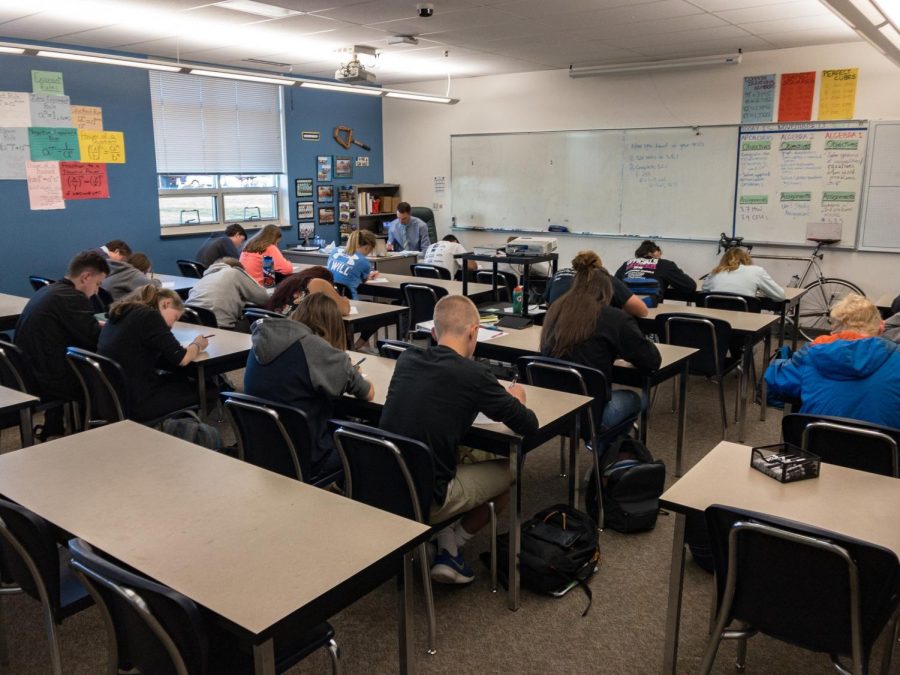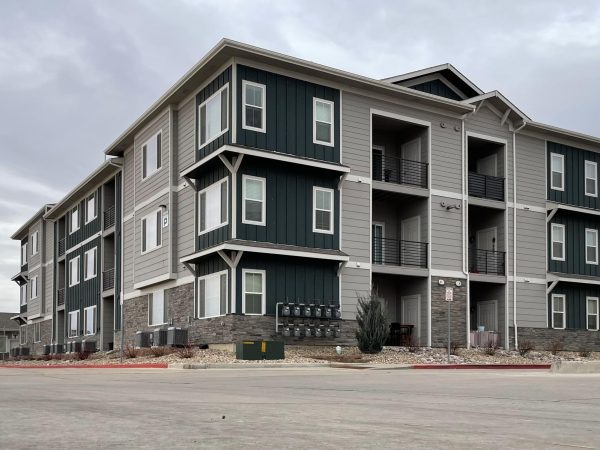How do students feel about our 80/20 grading policy?
Upperclassman who have attended MHS before and after the newly instituted grading policy share their thoughts
Mead High students focus on an assessment
November 10, 2017
The following is the second segment in a series meant to explore the 80/20 grading policy at Mead High School. Stay tuned for more installments.
If you have not yet read the first segment describing why MHS has the 80/20 policy, according to Principal Ayers, you can read that here.
***Note: A previous version of this article stated that the original policy was 60/40 (60% being summative, 40% being formative); however, this was never a policy at the school. It was common practice for several departments, but was not a school-wide policy.
Since the school has existed, there has been no formal grading policy, until 2015 when the 80/20 policy was put in place.
The policy is as follows: Learning activities are 20 percent of a student’s final grade (formative assessments), while assessments (summative assessments) are mostly exams, tests, and quizzes are 80 percent of the student’s grade.
Ever wondered how other students feel about the switch?
Understandably, students interviewed for this segment wish to remain anonymous.
One senior, Student A, said, “The prior system was more beneficial, and I also believe that the system caused teachers to assign less homework because you didn’t have to work as hard to make up for an assessment.”
Others agreed stating that since the policy has changed, student C says “My grades have suffered quite a bit. It’s tougher for me to do better in my classes.”
Others said that they have not been doing as well especially if they have anxiety with taking tests. Student D said “Because I have a lot of test anxiety, [the policy] made my grades suffer a little bit. I’m really good at getting stuff turned in on time. So learning activities [were] kind of how I survived. I could go through an anxiety attack in the middle of a test and not have to be worried about my grade” since their assignments were all turned in on time.” Many other students also struggle with test anxiety, and can no longer rely on homework grades to keep them from failing their classes.
When students were asked how they thought the teachers felt about the policy, Student B responded with “I know a few are outspokenly against it. As for the rest, I guess they haven’t really mentioned it.”
Senior A added “I couldn’t tell you how they may or may not feel. They seem more high strung with how everything is being ran as far as admin is concerned now. More assessments, more homework, more everything. Resulting in more work for the teachers to plan and therefore grade.”
Both of these students recognize that some teachers are okay with the policy, some don’t mention it, while others would change things to improve our policy.
The 80/20 grading policy also seems to reflect a shift in what is important at MHS. Students who have been subject to both grading policies were asked ‘What do you feel the school values more now that the policy has changed?’ Student A captured the sentiment shared by others interviewed for this segment: “I feel like they value more test scores than our well being… I don’t feel like they worry about what kind of people we are as much anymore.”
As a school, we may be representing a focus on assessment that negates the well-being of students; this is something we don’t mean to represent. How do we fix that?
Some students feel that this policy may not fit well as a school-wide policy, but would be a good for “math classes because the homework is a reflection of the assessment. So if you get your homework done then you will understand the process of the math that way it will reflect upon how your assessments go.”
Others disagree and said “If an art class said ‘Hey! This art project is gonna be an assessment, put your all into this’ That, in my opinion, is a little bit more appropriate than a math class where you put all this time into homework, but it seems as if it doesn’t really matter if your test grade still sucks.”
Student A explained “My stress levels, personally, have risen since my sophomore year. There seems to be more academic stress on us students, and less of a push to be involved. There was a shift from ‘Join this club! Everyone get together to make t-shirts for the upcoming events!’ And other things along those lines to more along the lines of ‘Take all 8 courses! Take AP classes! Stay on top of school. Off blocks are bad, etc.’ “
Principal Ayers has made clear that the switch in policy is not meant to be negative. She often reiterates that her goal is “to help [students] be successful after high school.” She has explained that college work is rigorous, so high school should prepare students to meet this challenge.
Interested in finding out how teachers feel? Next week, an additional segment will be published that explores teachers’ reactions to the 80-20 policy.














Bayleigh Melichar • Dec 13, 2017 at 10:47 pm
I also personally don’t like this system. Also because students could get away with not doing their homework and projects because they are doing well on the tests.
Aiden Owen • Nov 20, 2017 at 7:38 pm
I personally very much dislike the 80/20. there are many classes I would have much higher grades in just because I get really bad test anxiety and freeze up.